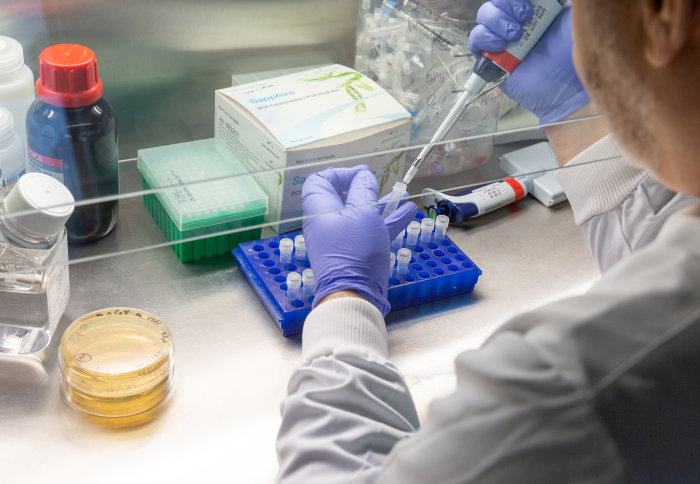Coronavirus vaccine team secures funding to move towards human trials
by Ryan O'Hare

Imperial researchers working on a vaccine for COVID-19 have been awarded government funding to take the work forward towards human trials.
[This article was updated 22 April 2020]
It was announced today that the group will receive £1.8 million from UK Research and Innovation and the National Institute for Health Research to further develop their promising RNA vaccine through pre-clinical stages and into early stage clinical trials.
The team, led by Professor Robin Shattock from Imperial’s Department of Infectious Disease, has been testing an RNA vaccine candidate in animals since early February.

Early findings have shown that animals given the vaccine are able to produce neutralizing antibodies against the novel coronavirus SARS-CoV-2. The team will now use the funding to develop their vaccine further and test whether it can produce the same response in humans, which could ultimately provide some protection against COVID-19.
Professor Shattock said: “We are one of a number of groups around the world currently trying to make an effective vaccine against COVID-19. The early stage work has been promising and so we’re delighted to receive this funding to take it forward to the next stage.
“Some of the other vaccine groups have already begun human tests earlier, but as our approach is still relatively new and has never been tried before, we need to complete the work in animal models to ensure it is going to be safe.
“The next step will be to show that our vaccine is tolerated in humans and whether it can produce the same promising immune response we’ve seen in our animal studies. Only then will have confidence it could be developed further and an accurate timescale.”

RNA vaccine
Professor Shattock’s team is developing a self-amplifying RNA vaccine for COVID-19. When injected, it will deliver the genetic instructions to muscle cells to make the ‘spike’ protein on the surface of the SARS-CoV-2 virus. This should provoke an immune response and create immunity to the virus.
The team has modified the RNA sequence to create a stabilised version of the spike protein, which they hope will provoke the body to produce more protective antibodies.
The £1.8m funding from the UK MRC will enable the researchers to take the vaccine through GMP manufacturing, further testing in animal models for safety and efficacy, regulatory and ethical approval. If these stages are successful, the funding will also enable them to take it forward to a Phase I clinical trial in healthy human volunteers.
Clinical trials are expected to begin in June and the team will look to recruit healthy adults to test the vaccine. Results could be available as soon as September. Full details of the trial, including patient numbers, length and inclusion criteria will be available on clinical trial registry. The trial is not yet open to recruitment but will be but will be announced in due course.

Dr Paul McKay, from the Department of Infectious Disease and who has been leading the preclinical development of the vaccine, said: “We made the vaccine candidate in record time and are so excited to start clinical trials that will test efficacy and hopefully make a difference to the ongoing pandemic."
Professor Shattock added: “If we think of the current race to develop a vaccine like climbing a mountain, we can say we’re now out of the foothills and starting the ascent, but we still have a long way to go before we reach the summit. Our group has made a positive start but it still may be some time before a safe and effective vaccine is available for people to use.”
This article is based on materials provided by the UK Research and Innovation, and the National Institute for Health Research.
Article supporters
Article text (excluding photos or graphics) © Imperial College London.
Photos and graphics subject to third party copyright used with permission or © Imperial College London.
Reporter
Ryan O'Hare
Communications Division